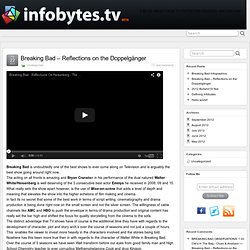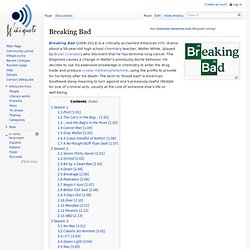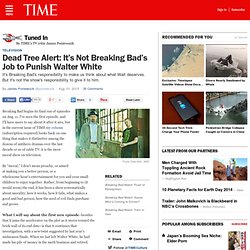

Dark Matter: Recap for Breaking Bad Episode 515, "Granite State" "Borrowed time and borrowed world and borrowed eyes with which to sorrow it.

"-Cormac McCarthy, The Road "Wild men who caught and sang the sun in flight,And learn, too late, they grieved it on its way,Do not go gentle into that good night.Grave men, near death, who see with blinding sightBlind eyes could blaze like meteors and be gay,Rage, rage against the dying of the light. "-T.S. Eliot, "Do Not Go Gentle Into That Good Night" "What about the soul? " On Death and Dying In her 1969 book "On Death and Dying", Elizabeth Kubler-Ross proposed a psychological model that outlined five discreet phases in the emotional processing of death: anger, denial, bargaining, depression, and acceptance. Consigned to a bunker during the final days of the Third Reich, Adolf Hitler, in the ultimate display of dictatorial caprice, obsessively planned the rebuilding of Berlin. But even after a three day journey across the country hidden inside an empty propane tank, Walt hasn't gotten past the denial stage. Breaking Bad Observations 1.01 Pilot - Clues & In-depth visual Analysis.
Breaking Bad – Reflections on the Doppelgänger » Infobytes TV Blog. Breaking Bad is undoubtedly one of the best shows to ever come along on Television and is arguably the best show going around right now.

The acting on all fronts is amazing and Bryan Cranston in his performance of the dual natured Walter White/Heisenberg is well deserving of the 3 consecutive best actor Emmys he received in 2008, 09 and 10. What really sets the show apart however, is the use of Mise-en-scène that adds a level of depth and meaning that elevates the show into the higher echelons of film making and cinema. In fact its no secret that some of the best work in terms of script writing, cinematography and drama production is being done right now on the small screen and not the silver screen.
The willingness of cable channels like AMC and HBO to push the envelope in terms of drama production and original content has really set the bar high and shifted the focus for quality storytelling from the cinema to the sofa. . 1) The creepy kid in the shining. 2) Gollum. Breaking Bad. Season 1[edit] Doctor: Mr.

White? Mr. White? Doctor: You understood what I've just said to you? Walter: Yes. Walter: It's me. Jesse: How'd you find me? Walter: You're still in our filing system. Jesse: I own it. Walter: No one's looking for you. Jesse: Why are you here? Walter: I was curious. Dead Tree Alert: It’s Not Breaking Bad’s Job to Punish Walter White. Breaking Bad begins its final run of episodes on Aug. 11.

I’ve seen the first episode, and I’ll have more to say about it after it airs, but in the current issue of TIME my column (subscription required) looks back on one thing that makes it distinctive among the dozens of antihero dramas over the last decade or so of cable TV: it is the most moral show on television. By “moral,” I don’t mean preachy, or aimed at making you a better person, or a wholesome hour’s entertainment for you and your small children to enjoy together.
Rather, from beginning to (it would seem) the end, it has been a show systematically about morality: how it works, how it fails, what makes a good and bad person, how the seed of evil finds purchase and grows. What I will say about the first new episode–besides that it jams the accelerator on the plot as it steers toward the brick wall of its end date–is that it continues that investigation, with a new twist suggested by last year’s midseason finale. 20 Neat Facts, Cool Allusions, Instances Of Foreshadowing, And Theories On 'Breaking Bad' 1.

Cool Allusion: The name of the last episode of season one is “A No-Rough-Stuff-Type Deal.” That’s a line from Fargo. The name of the third episode of season three is “Cancer Man,” a possible reference to Smoking Man — also called Cancer Man — in Vince Gilligan’s old show The X-Files.